- Home
- David Pilling
Hardway
Hardway Read online
HARDWAY
By David Pilling and Martin Bolton
Prologue
In the high days of the Old Kingdom, the ruler of that great and terrible nation wished to build a new prison. His dungeons were full to overflowing, and he needed somewhere else to keep those deemed too useful or precious to kill.
“Find me a prison-house,” the King ordered his servants, “far away from the heart of our realm. Somewhere secure, remote, and safe from prying eyes.
After much searching an island was chosen, two miles off the western coast in the middle of angry seas. The island was not deserted, but the fishing villages that clung to its coasts were soon persuaded to clear out by a squadron of royal warships.
Workmen and labourers arrived in the wake of the soldiers. They constructed a prison camp near the western shore, where the only flat ground was located. The rectangular stone huts were defended by a high wall and strong gates, though the island already had its own natural barriers. Much of it was surrounded by a wall of mountains, bleak and rugged and inhospitable to all save the hardiest of men.
Anyone who managed to get past the guards and over or under the wall would have to somehow cross miles of turbulent ocean to the nearest land. There were no boats, save those kept under lock and key and guarded by royal troops. These were unbribable veterans of the King’s crack legions, paid triple their standard wages to spend the last year of their term of service on the island.
This desolate, windswept rock in the middle of a lonely sea became the home of convicts; the last resting place for many of the former, considered too mad or dangerous to ever be released. They lived in uneasy peace with their guards, old soldiers, pensioned off and left to rot. In the course of time, the island became a tomb for them all, and gulls wheeled and cawed above rows of neat graves on the headland. .
Years rolled into decades, decades into centuries. As the Old Kingdom gradually crumbled under the pressures of civil war and foreign invasion, the distant colony started to acquire its own identity. Cut off from the mainland, infrequently visited by royal auditors, it took on a semi-independent status.
The numbers of the garrison grew less and less, as soldiers were needed to defend the mainland. The governors of the colony, themselves usually failed or retired politicians, allowed the strict prison regime to fall into abeyance. Inmates were allowed greater freedom, to mingle with each other, even marry. With nothing to prevent them from leaving, many built boats and sailed away to freedom or a watery grave.
A few stayed. They saw the island as their home, their last bitter refuge against a world that had betrayed and rejected them.
“Let us hold it against all comers,” said the last of the royally appointed governors, a man named Alexei. “The Old Kingdom can go to hell. We rule ourselves now.”
And so they did.
1.
“Spare a penny for the General. Spare a penny so he doesn’t starve.”
He repeated the same words over and over again in a reedy, high-pitched voice, accompanied by the tap of a stick on rough cobbles.
Behind him, a group of children egged on one of their number to trip the old man up and steal his wooden begging bowl, which was half-full of copper pennies. The children were typical street-scabs, thin and pale and underfed, dressed in shabby hand-me-down clothing.
“Go on,” one of them whispered to his mate, “trip the old fool up. Take his bowl. We can feed in a chop-house for a week on the pennies in there.”
The others stifled their giggling as the boy crept up alongside the old man, and daringly stuck out a foot.
Two seconds later the boy found himself flat on his back with the edge of the beggar’s stick pressed against his jugular.
“You’re dead,” said the beggar, his whine replaced by a deeper tone, “or would be, if this stick was a sword. I could still thrash you handsomely with it.”
The boy gulped. His mates fell about laughing as they watched his humiliation.
“Get up,” said the beggar. “I am not yet reduced to hurting children.”
He removed his stick from the boy’s throat. “I see you, lad.” He sighed. “My eyes may be gone, but I can still picture you. A weedy little runt in a threadbare shirt and cracked breeches. No shoes on your feet. Belly lean with hunger. Knuckles swollen and callused from fighting to stay alive. Eyes like piss-holes in the snow. Oh yes, I can see you very well. Would you like to know how?”
The boy gingerly picked himself up and made to steal away. Fingers like bunches of steel wire gripped his neck.
“Because I was you,” the beggar went on, ignoring the boy’s frantic efforts to wriggle free, “years ago. So many years. Another city, another life. I started in the gutter, and would have died there if I hadn’t joined the army. They would take any old rubbish in those days. Spear-fodder, the officers called us. This bit of spear-fodder survived the battles and went on surviving until he could claw his way up the chain of command, and then…”
He fell silent for a moment, gazing sightlessly at the past. Then he came to life again and tightened his grip on the boy’s neck.
“Take some advice,” he rasped, “never join the fucking army. Any army. Never be loyal, or brave, or patient. Never distinguish yourself. Above all, never try and rob a man just because you think he is old and blind and can’t defend himself.”
“Yes, sir,” the boy muttered.
“‘Yes, sir,’” the beggar repeated. “Gods above, you might make a soldier yet. Go on.”
He slackened his grip, and the boy sprang away like a terrified deer. The beggar stood still for a moment, listening with a wry smile to the taunts and abuse the boy suffered from his friends.
Their piping voices faded away, lost in the throng of market day. The beggar frowned as the distinct aroma of blood and fresh meat filled his nostrils.
“Are you all right, General?” asked an anxious male voice, “I’m sorry for the behaviour of those lads. One of them is my nephew. I’ll speak to his mother this evening. She’ll tan his hide.”
The old man smiled again. Most people in Hardway were related. He had no family here, which reinforced his sense of being an outsider.
“I am fine, Eugen,” he replied. “No harm done, save maybe to the boy’s pride.”
He braced himself. The butcher was going to try to be kind to him. No matter how often he rebuffed them, people never stopped trying to be kind.
“Even so,” Eugen said, “you must be a little shaken. Come into my shop and sit down for a while. Take a pipe and a cup of ale.”
“No, thank you,” the old man said brusquely, “my walk has been interrupted for long enough. I must get on.”
He brushed past Eugen, wincing at the stench of dead animal that rose from the butcher’s clothes, and continued on his way down the street. The bustling crowds parted to make way for him. They always did.
Half an hour later, he was sat on his usual bench next to the great stone beacon known as the Eye. The Eye was perched on a cliff overlooking the town and the sea, and reached via a winding stair cut into the cliff. The stair consisted of exactly two thousand steps. No matter how foul the weather, the old man climbed them every day.
It was high summer, the all-too brief summer that Hardway knew for only six weeks of the year before storms and gales closed in again.
The General sighed with pleasure as unaccustomed heat seeped into his bones. He could no longer see the world spread out before him, but he could smell the salt air, feel the bright sun, hear the gulls wheeling over his white head. Imagine the seals basking contentedly on the rocks far below. He shared their contentment.
In his mind’s eye he could picture exactly the town below, down to the last detail. In his former life he had studied dozens
of maps and diagrams of the place, and frequently cursed it from afar. Now he loved Hardway with the same intensity that once inspired him to plan its destruction.
The town was packed between two cliffs which jutted into the sea and formed a natural inlet. The Eye stood on one cliff, while its neighbour was occupied by Fort Alex. In the days when Hardway was a prison colony, the fort had been a mere watchtower. After independence the tower had been expanded and re-fortified into a small castle. The fort was named after Alexei, last of the old prison governors and first of Hardway’s long line of mayors.
Fort Alexei was a minor wonder of military engineering. It consisted of six stone circles built on top of each other, like the layers of a cake. Each circle was smaller than the one beneath and acted as a platform for long and short-range artillery. The lower circles were occupied by ballistae and a type of repeating bolt thrower, while the highest were mounted with catapults. The sixth platform was home to a monstrous trebuchet that could hurl gigantic stone balls up to a mile out to sea. Each circle was built on a rotating platform operated from a chamber dug out of the rock underneath the fort, so the artillery could be turned to point in any direction.
As an old soldier, the beggar could only admire the genius of the unknown architect who had designed the fort. He wished he could see it again.
As always when he came to the Eye, the memories came creeping back. Terrible memories, their pain dulled only a little by time and familiarity. Sitting on this windswept spot and enduring them was his tribute to the past.
He remembered the sea beyond the inlet strewn with the wreckage of a great fleet. Dozens of triremes, dromons and galleys, burning or sinking under the waves. The old man could still hear the screams of the sailors as they floundered in the water. Their screams mingled with the yells of soldiers, labouring in vain to storm the sea-wall. The defenders on the rampart hurled missiles down on their heads—arrows, rocks, pots of boiling oil and scalding porridge, even bits of furniture—and cast down the scaling ladders as quickly as they were thrown up.
From the deck of his flagship, General Dusek had watched in despair as his carefully planned assault failed utterly. He could feel the accusing stares of his officers. They were doomed, and it was his fault. This defeat would mean the ruin and destruction of them all.
The old man shivered. His discomfort had nothing to do with the gentle wind blowing in from the sea. For some reason his memories were particularly vivid and painful today.
“I begged him,” he whined, though he was alone on the high cliff. “I went down on my knees and begged him. Don’t attack Hardway. The island cannot be taken. There is nothing to be gained from such a futile attempt. You are throwing away the lives of your men.”
Dusek shifted uncomfortably on the cold stone seat. “I had to do it anyway. He made me lead the attack. ‘You are my best commander,’ he said. ‘I want the island. I need the island. Get it for me.’”
He grimaced, and rubbed his forehead. There was a slight pain in his head, just behind where his eyes used to be. He cursed. All this useless guilt and anguish was giving him a migraine.
The people of Hardway called him the General. They had treated him with nothing but respect and compassion since he arrived on the island: respect and compassion, for a man who had done his damnedest to destroy them. Had the roles been reversed, the old man would not have shown such mercy. Any mercy at all.
He knew it was wrong, but he despised their compassion. It was only because he was blind. They pitied him as a defenceless, friendless cripple. He didn’t want their pity. He wanted his pride.
He wanted his daughter back. The thought of her caused a fresh stab of pain behind his empty eye-sockets, another in his heart.
“Damn,” he muttered. The pain in his head was getting worse. Strange. He wasn’t prone to headaches or other such minor ailments. At sixty-five, his body was as fit and vigorous as a man half his age. Or so he told himself.
He stood up. The pain grew worse still. He swayed for a moment, clutching his head and gritting his teeth. It felt like something was about to burst inside his skull.
“You old fool,” he gasped, “you stupid, weak old fool. Die then. Drop dead here. Let them bury you and forget you. Do it.”
Old General Dusek had known nothing but darkness for twelve years, ever since the torturers burned his eyes out. Now a sudden blaze of red light exploded inside his head, accompanied by searing, unbearable pain.
He screamed and fell to the ground.
2.
Maximilian concentrated intently on each brush stroke. No soft skin tones here, no pert, alabaster bosoms, no flowing blonde hair, no innocent blue eyes and no playful expression hinting at, but never showing, the subject's burning sexuality. No such conformity for the great Maximilian Shackle, oh no, he was a revolutionary, a pioneer! He would show those tyrants at the Masters Temple that painting should be the fullest expression of man's true vices and virtues, not a rigid oppression of them. He would paint evocative images of all the darkness and the light within, not bland scenes of piety and idealism. If a bard could sing of a bloody battle, could he not paint a demonic vision of the desires which cause such barbarism?
His paintings would show the world that man's beauty lies in his weaknesses, and that perfection is an ugly myth. Not only that, damn it, but he would show the so-called Masters that art, true art, cannot be tethered to their outdated ideals. He just needed the right inspiration, the right subject matter, and they would see he was right. Then they would be begging him to come back to the temple, to take his rightful place amongst the Masters.
“Max, please, can we have a break?” Eva shivered, wrapping her arms around her naked shoulders, “I'm freezing.”
“Keep still!” he replied. “I am almost there. Just a few more minutes.”
“Why must I pose at night? It is too cold.” She grimaced and hugged herself, vigorously rubbing her hands on her arms.
“I have explained this, Eva.” Maximilian was losing patience. “I am painting the legend of The Moment of Silence, the blacksmith that exists only in the moment of silence following the ring of his hammer. The painting shows that very moment: you are shown in the glow of his forge. I must paint you by candlelight to capture the colour of the flames on your skin! Besides, I am paying you well to model for me, so kindly hold your position until I have finished.”
“There is a difference between agreeing a fee and actually paying one, Max.” Eva assumed her pose again, that of a frightened maiden, horrified at some unseen horror. Naked, of course.
“Oh yes,” replied Maximilian sarcastically, “pray tell, what might that be?”
“Well at the moment it is about one hundred and fifty sovereigns.” Eva gave him a triumphant look.
“Ah,” Maximilian tried desperately to think of a clever answer and found none, “is it that much?” Damn it, why did he have to choose such an intelligent and eloquent muse? All his peers had chosen whores who were happy as long as they were kept sufficiently off their tits on murka and given plenty of cheap wine. In every verbal exchange with this woman, he seemed to come off second best. But then, that was why he liked her. After all, if something wasn't a challenge it wasn't worth doing.
Before he could think of an answer, Eva had wrapped herself in her thick gown, gone over to sit on the window sill with a bottle and started rolling a cigarette. He watched helplessly as she sprinkled a pinch of his murka leaf into it.
As he painstakingly put together a stirring speech to justify his debt, there was a knock at the door. Not a polite tap-tap, but an obnoxious rapping conjuring the image of a large, hairy fist in Maximilian's mind and making the door rattle violently in its frame.
Maximilian jumped. His brush and wooden pallet clattered on the floorboards. Eva rolled her eyes at him and went back to gazing elegantly out of the window and smoking. He tried to pull himself together and approached the shuddering door wiping his hands on a cloth.
“Yes, yes, I'm coming!” h
e called nervously as he attached the safety chain and slid the bolt free. The knocking ceased immediately, leaving a pregnant silence. Slowly, Maximilian eased the door open the hand's breadth that the safety chain would allow and peered through the gap.
He was confronted with a pair of lumpen hands, their knuckles like the gnarled and twisted roots of an ancient tree, axe-handle thumbs tucked patiently into a thick leather sword belt.
Maximilian's gaze instinctively wandered upwards along one tattooed trunk of a forearm, up farther still, past a shoulder the size of a stallion's rump, on past a thick volcano neck, and finally rested on the implacable visage of Rollo. The vast henchman peered down at him from the dimness above the door frame.
“Tulgan wants to see you,” warbled Rollo in his deceptively high-pitched voice.
Rollo was indeed a paradox. By far the biggest man Maximilian had ever seen. He moved with an ungainliness that made him appear wooden, like some otherworldly creature removed from its natural environment. Yet those unfortunate enough to know him long enough knew that his natural environment was any state of extreme violence. When a situation got ugly, and they frequently had when blessed with Rollo's presence, he moved with a devastating swiftness and grace.
Rollo the Wind, he had been dubbed by the more poetic of Hardway's criminal fraternity, because he could be eerily still or unstoppably destructive. And he could change in the blink of an eye, without warning. He was more commonly known amongst the blunter, less imaginative scum of Hardway as Grizzly Rollo, Runaway Rollo (either because he was like a runaway wagon or because that's what most people did when they saw him), Red Rollo, and many more.
Maximilian, on the other hand, knew the real reason why Rollo was considered a paradox. The man sang like an angel, though people were forbidden to speak of it as it went against the necessary persona required by his profession. And he was very professional.
“I told him,” replied Maximilian, unhooking the chain and backing away from the door, “I'll have his money in a few days. I have works to sell at market.”

 The Growth Delusion
The Growth Delusion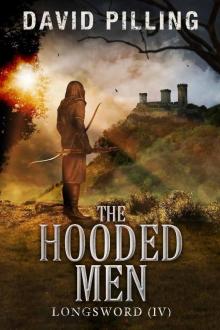 The Hooded Men
The Hooded Men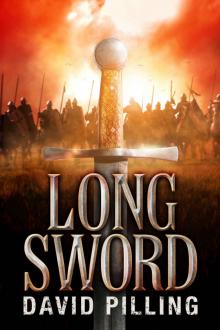 Longsword
Longsword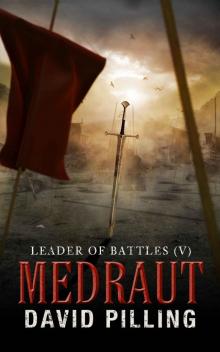 Medraut
Medraut Hardway
Hardway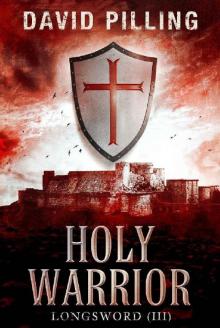 Holy Warrior
Holy Warrior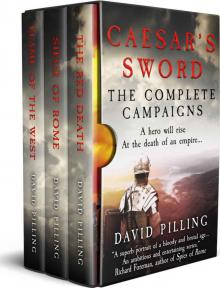 Caesar's Sword: The Complete Campaigns
Caesar's Sword: The Complete Campaigns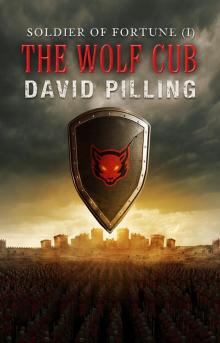 The Wolf Cub
The Wolf Cub Reiver
Reiver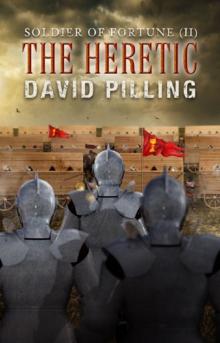 The Heretic
The Heretic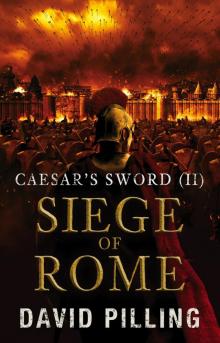 Siege of Rome
Siege of Rome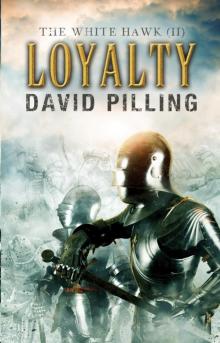 Loyalty
Loyalty The Path of Sorrow
The Path of Sorrow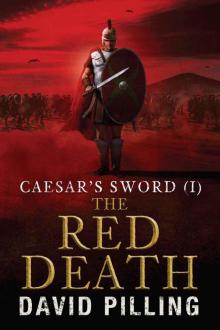 Caesar's Sword (I): The Red Death
Caesar's Sword (I): The Red Death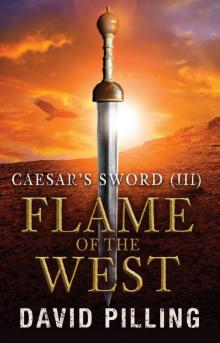 Flame of the West
Flame of the West The Best Weapon
The Best Weapon Sacrifice
Sacrifice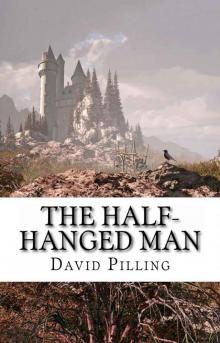 The Half-Hanged Man
The Half-Hanged Man